Which lunch box is healthier? Looks can be deceiving
LOOKS can be deceiving. One of these school lunches is a lot healthier than the other. Can you pick which one?
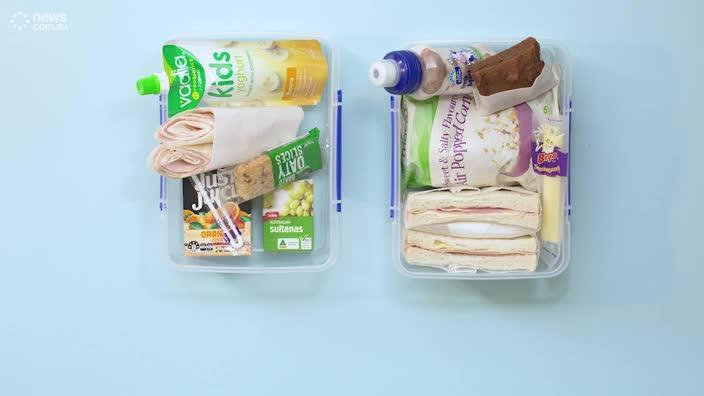
School Life
Don't miss out on the headlines from School Life. Followed categories will be added to My News.
WITH recent calls for teachers to report parents with overweight kids and some schools already inspecting the contents of lunch boxes to give parents feedback on what are acceptable choices, it is not surprising school lunches is a hotly debated topic.
Children consume at least 1/3 of their total daily calories while they are at school and with at least one in five kids already battling a significant weight problem in Australia, drastic steps do need to be taken.
Unfortunately nutrition and healthy eating is complicated — when it comes to school lunches it is not always as simple as classifying foods as “good’ and ‘bad”. In some cases foods that may look a lot healthier than others are highly processed and packed full of sugar, while others are processed but still offer fewer calories and a better nutrient profile than foods commonly considered “healthy”.
Ideally a school lunch box will contain a mix of slowly digested carbohydrates; proteins for key nutrients and to help regulate energy throughout the day and fresh fruit and vegetables.
Getting this mix, with foods that children are happy to eat at school, especially when compared to the processed, packaged, brightly coloured snacks their friends are likely to be enjoying can be challenging.
To give some insight into why nutrition is not always what it seems, here is a comparison of two lunch boxes — the first would generally be considered the healthier option, yet when we take a look it contains more than double the sugar content of the second lunch box.
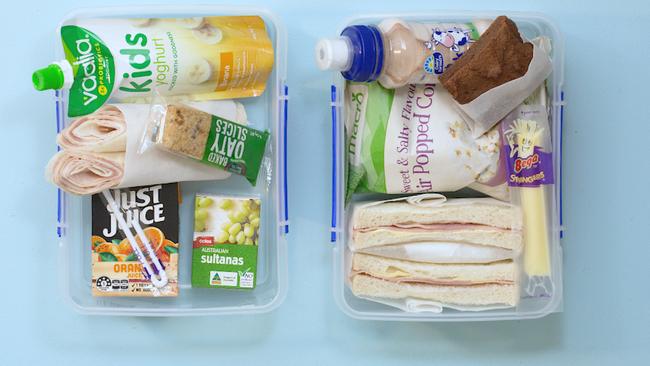
LUNCH BOX 1
220ml orange juice popper
Kids’ yoghurt
Mission wrap with 2 slices of ham
Box of sultanas
Mother Earth Bar
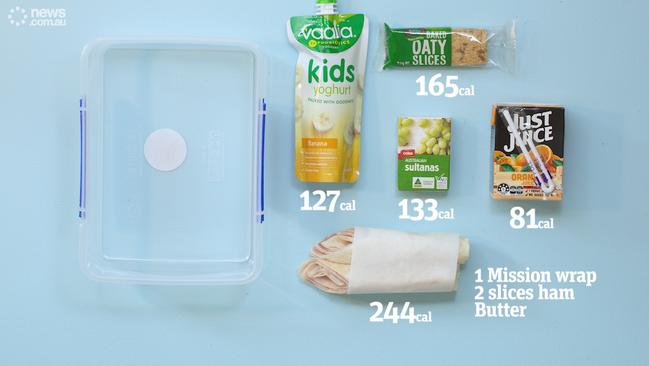
LUNCH BOX 2
Bega cheese stick
Wonder White sandwich with 2 slices ham
Popcorn
I Quit Sugar homemade brownie
150ml milk + 1 tsp milo
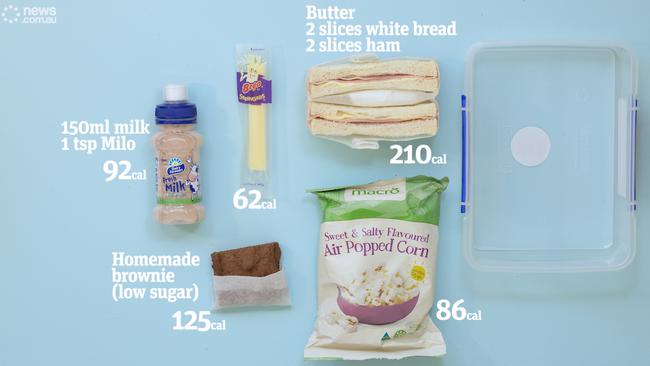
NOW LET’S TAKE A LOOK AT THE NUTRITION
LUNCH BOX 1
750 calories
25g protein
16g fat
115g carbs
69g sugar
7g fibre
LUNCH BOX 2
575 calories
31g protein
19g fat
67g carbs
20g sugars
8g fibre
WHY IS LUNCH BOX 2 BETTER NUTRITIONALLY?
The primary issue with lunch box 1 is that it is relying heavily on processed fruit products that contain much sugar — even though some of these sugars may be natural sugars, they are in concentrated amounts, and especially the dried fruit and fruit based yoghurt.
The snack bar is one of the highest sugar snack bars in the supermarket, even though it appears to be “healthy” and “wholesome” and this large wrap contains significantly more salt and less fibre than a high fibre white bread. In addition, packaged snacks and processed fruit products has been used in place of water for drinking and fresh fruit and vegetables.
While lunch box 2 is also lacking in fresh fruits and vegetables, the snack foods chosen are relatively low in sugar; dairy snacks add much in the way of calcium and protein and are filling, while home baking will always be a better option that processed snack foods.
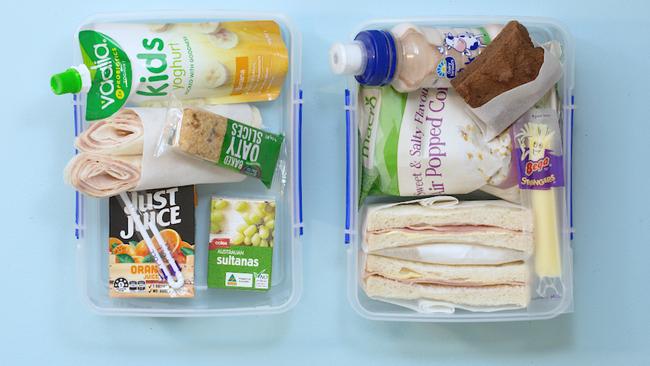
WHAT DOES AN IDEAL LUNCH BOX LOOK LIKE?
A nutritionally balanced lunch box will contain at least one vegetable, one piece of fresh fruit, a dairy snack such as cheese or a low sugar kids yoghurt, a wholemeal or high fibre sandwich and at most 1 other snack — either a low sugar snack such as popcorn, or a small snack bar, or even better some home baking. Most importantly water should be the primary choice of fluid for children.
Originally published as Which lunch box is healthier? Looks can be deceiving


